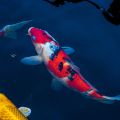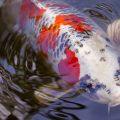HOW TO SELECT TOSAI WITH THE HIGHEST GROWTH POTENTIAL

Selecting Tosai which can one day become jumbo koi takes exceptional skill, experience and a keen eye. However, there are a number of characteristics you should look for, which are highlighted below.
Evaluate The Size, Pattern And Body
Some Kohaku are clearly high class, and stand out from the pack. Look for specimens which are thirty centimeters or more, than have a vibrant pattern with a nicely shaped body and head. The skin and color quality should also be top notch. The fish doesn’t have to be perfect, but it needs to be close. Their skin will become thicker as they develop, and as such you should avoid purchasing “upscale” koi that display a lot of Seshi since as their skin thickens this pattern will be covered.
The ideal koi is one that has a broad head and mouth, with eyes that are set well apart. Additionally, there should be considerable length between the mouth and eyes and in general the body should be long in comparison to its head. If the body is short and or stocky, it is very unlikely that it will grow into a large fish. Show quality koi also have robust backbones, with a good degree of height between their dorsal and head.
Koi collectors prize expensive fish that have a peduncle wrist which is thick, although it isn’t essential. The reason is because they will build up this area naturally over time. What isn’t desirable is a tail which is too short, and this may be determined in advance by inspecting the rear end near the dorsal fins. If the fin leaves a gap near the tail base that is too tight, this should be considered a red flag. Finally, if the thickest part of the fish is behind their grill cover, it is a sign that the fish will become too “chesty” when it grows.
Pay Close Attention To Bloodlines And Genetics
In your search to find koi that will one day become show quality specimens, lineage is essential. If both parents are large, there is a good chance their offspring will be to. Size however is more important in females than males. The chance of a 70 cm female koi producing offspring which is 80 cm is miniscule so this is something you should always keep in mind. Before buying koi, always request to see the older koi from within the same family set, and this will provide clues as to how the younger koi will appear as they age.
Breeding Techniques Will Differ From One Breeder To Another
Different koi breeders will utilize distinct growth techniques, and it is important to know this before shopping for your fish. For example, some breeders choose to raise their Tosai during winter with a great deal of food that is colorful, which might result in fish that are bright red or orange, whereas a different breeder might produce Tosai which is exceptionally orange, that over time will morph into red Nisai.
Other articles and publications:
- +1 (908) 998-2556
- 205D US-22, Green Brook Township, NJ 08812
- everythingkoi.com







